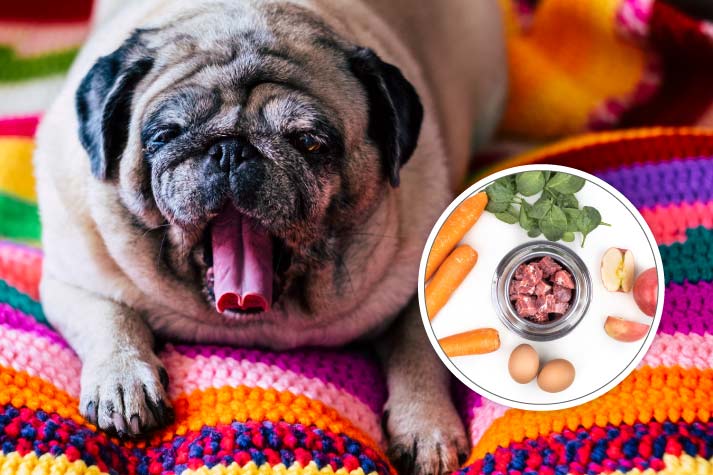


06 Dec
As pet parents, the health and safety of our pets is paramount. Pet obesity is a growing concern for pet owners, as it can significantly affect a pet's health and quality of life, not to mention complicate activities like pet travel. Obesity occurs when there is an abnormal or excessive accumulation of fat in the body, leading to various health complications.
Fortunately, with proper diet management and regular exercise, pet obesity can be prevented. Recognizing the signs early and taking proactive steps can help keep your pet healthy and active.Here's how you can tackle obesity and ensure your pet's well-being.
Pet obesity is a state which occurs when a pet consumes more calories than they burn. This imbalance often results from overfeeding, a lack of physical activity, or oftentimes both. Over time, unused calories are stored as fat, leading to an excessive and unnatural gain in weight.
Obesity in pets is more than just a cosmetic issue, it’s a serious health problem which affects a large number of pets. A pet's metabolism and energy needs are different from humans, and even small amounts of overfeeding can result in significant weight gain. Understanding this fact can help pet owners take preventive measures to keep their pets fit.
Chonky pets can look cute, but obesity is no laughing matter. Extra weight poses serious risks to your pet's health, affecting their daily life and longevity. For humans, gaining an extra kilogram might not seem like a big deal, but for pets, even a small weight gain is significant because their bodies are much smaller.An increase of 1 kilogram isn’t much when you weigh 70 kilograms, but the same gain for a pet that weighs 10 kilograms is a dramatic increase in weight.
Carrying excess weight increases the likelihood of various health issues, such as:
Being overweight can also further decrease your pet’s energy and enthusiasm for play, making them more prone to a sedentary lifestyle, which worsens the problem.
Diet plays the most significant role in managing your pet’s weight. The food your pet eats directly influences their overall health, energy levels, and ability to maintain a healthy weight. Many pet owners unintentionally overfeed their pets by not measuring portions or by frequently offering high-calorie human foods and snacks.
High-quality pet food designed for your pet's age, breed, and activity level ensures they receive the right balance of nutrients without unnecessary fat or calories. Conversely, a diet filled with high-calorie treats, table scraps, or low-quality pet food can quickly lead to weight gain. A well-regulated diet not only keeps your pet’s weight in check but also improves their energy levels and reduces their risk of obesity-related diseases.
It’s important to recognize the signs of obesity early. Knowing your pet’s ideal weight and keeping track of changes can help you take timely action. Common indicators of pet obesity include:
Pay attention to these warning signs and act promptly to address them.
Focus on a Healthy Diet - Overfeeding is a primary cause of pet obesity. Foods high in calories, including human snacks and treats, can quickly lead to weight gain. Maintaining a calorie deficit is key to weight loss; consult your vet and draw up a diet plan to help your pet shed weight without any side effects.
To help your pet lose weight:
Be Mindful of Treats - Treats are a great way to reward and train pets; however, over-using them can lead to weight problems for your pet. Many treats are calorie-dense, so try to choose healthier options and serve them sparingly. Make sure to take your pet’s calories from treats into consideration to avoid overfeeding. Consult your vet for advice on low-calorie treats that can keep your pet motivated without contributing to weight gain or swap out the store-bought treats for some healthier homemade options.
Encourage Regular Exercise - Exercise is essential to help your pet burn calories and stay active. Not only does it help with weight loss, but it also keeps your pet mentally stimulated, preventing boredom and destructive behaviors.
Start with light activities, especially if your pet isn’t used to regular or rigorous physical activity, and gradually turn up the intensity. Ideas for exercise include:
Before making significant changes to your pet's diet or activity level, consult your veterinarian. A vet can assess your pet’s overall health, establish a safe target weight, and recommend a customized diet and exercise plan. They can also monitor progress and adjust the plan as needed, ensuring your pet loses weight gradually and safely.
Pet obesity is a serious issue that affects your furry friend’s health, energy, and overall quality of life. However, it is preventable and manageable through a combination of proper diet, regular exercise, and guidance from your vet. A balanced diet tailored to your pet’s needs is the cornerstone of weight management, ensuring they get the nutrients they need without unnecessary calories.
By recognizing the signs of obesity early and sticking to a consistent routine, you can help your pet achieve and maintain a healthy weight. With your support and commitment, your pet can enjoy a happier, healthier life.

AUTHOR’S BIO
Shivangi Lawania
Storytelling is my way of bringing ideas to life. I enjoy shaping words that spark curiosity and connection, while keeping a strong focus on branding and communication. For me, great content blends creativity with clarity to leave a lasting impression.